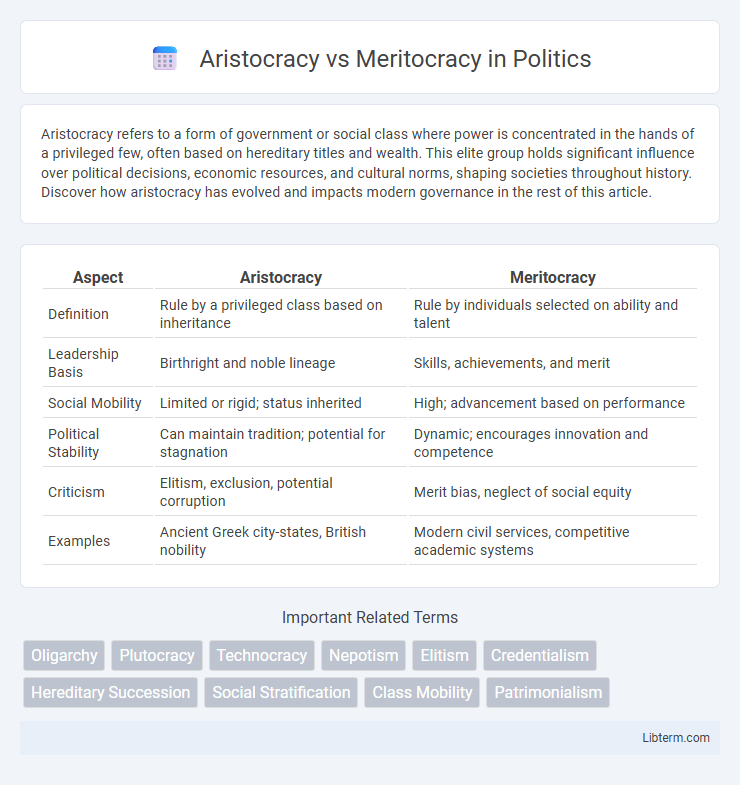Aristocracy refers to a form of government or social class where power is concentrated in the hands of a privileged few, often based on hereditary titles and wealth. This elite group holds significant influence over political decisions, economic resources, and cultural norms, shaping societies throughout history. Discover how aristocracy has evolved and impacts modern governance in the rest of this article.
Table of Comparison
| Aspect | Aristocracy | Meritocracy |
|---|---|---|
| Definition | Rule by a privileged class based on inheritance | Rule by individuals selected on ability and talent |
| Leadership Basis | Birthright and noble lineage | Skills, achievements, and merit |
| Social Mobility | Limited or rigid; status inherited | High; advancement based on performance |
| Political Stability | Can maintain tradition; potential for stagnation | Dynamic; encourages innovation and competence |
| Criticism | Elitism, exclusion, potential corruption | Merit bias, neglect of social equity |
| Examples | Ancient Greek city-states, British nobility | Modern civil services, competitive academic systems |
Defining Aristocracy and Meritocracy
Aristocracy is a social system where power is held by a privileged class, often based on hereditary titles and lineage, emphasizing birthright and noble ancestry as criteria for leadership and influence. Meritocracy, in contrast, is a system that allocates power and status based on individual talent, skills, and achievements, promoting advancement through demonstrated merit rather than inherited privilege. These definitions highlight fundamental differences in the principles guiding social hierarchy and governance, where aristocracy relies on tradition and birth, while meritocracy prioritizes competence and performance.
Historical Origins of Aristocracy
Aristocracy originated in ancient Greece, where power was concentrated in the hands of a privileged ruling class believed to possess superior birth and noble lineage. This system entrenched social hierarchies and hereditary privileges that shaped political structures and governance in medieval Europe and feudal societies. The emphasis on bloodline distinguished aristocracy from meritocracy, which bases authority on individual achievement and ability rather than inherited status.
Evolution and Principles of Meritocracy
Meritocracy evolved as a system emphasizing individual talent, effort, and achievement rather than inherited status, contrasting with aristocracy's emphasis on lineage and social class. This principle promotes equal opportunity by rewarding skills, education, and accomplishments, fostering social mobility and innovation. Meritocratic societies prioritize competence and performance, aiming to create a more efficient and fair distribution of power and resources based on measurable merit.
Key Features and Differences
Aristocracy is a social system where power is concentrated in the hands of a hereditary elite, often based on lineage, wealth, and noble titles. Meritocracy emphasizes individual achievement, promoting leadership and social status based on talent, skills, and accomplishments rather than birthright. The key difference lies in aristocracy prioritizing inherited privilege, whereas meritocracy values performance and merit for societal advancement.
Social Mobility: Opportunity vs Inheritance
Aristocracy concentrates social mobility on inheritance, with power and privileges passed down through family lineage, limiting opportunities for individuals outside noble birth. Meritocracy emphasizes opportunity by rewarding talents, skills, and achievements, enabling individuals to ascend social ranks based on personal effort regardless of background. This systemic contrast shapes societies either by preserving established hierarchies or by promoting dynamic, performance-based advancement.
Governance and Power Distribution
Aristocracy centralizes governance and power within a hereditary elite, often limiting social mobility and political participation to a privileged class. Meritocracy distributes authority based on individual abilities, achievements, and qualifications, promoting efficiency and equal opportunity in leadership roles. Power distribution in meritocratic systems tends to be dynamic and performance-based, contrasting with the rigid, inherited hierarchies characteristic of aristocratic rule.
Impact on Education and Career Advancement
Aristocracy often limits access to quality education and prestigious career opportunities based on hereditary privilege rather than individual talent, perpetuating social inequality. Meritocracy, by valuing skills and achievements, promotes equal educational opportunities and career advancement, fostering a more diverse and competitive workforce. Countries emphasizing meritocratic principles tend to experience higher innovation rates and economic growth due to optimal utilization of human capital.
Criticisms and Controversies
Aristocracy faces criticism for perpetuating inequality by privileging birthright over ability, often leading to entrenched social hierarchies and limited social mobility. Meritocracy, while promoting talent and effort, encounters controversies regarding biases in measuring merit and the potential to overlook systemic barriers affecting equal opportunity. Both systems are debated for their impact on fairness and the distribution of power within societies.
Modern Societies: Blending or Conflicting Systems?
Modern societies often exhibit a complex interplay between aristocracy and meritocracy, where traditional elite families maintain influence alongside emerging talent-based hierarchies. Meritocratic principles drive social mobility by rewarding skills, education, and achievements, yet inherited wealth and social connections can perpetuate aristocratic advantages. This blending of systems generates ongoing debates about equity, access to opportunities, and the true meritocratic nature of contemporary social structures.
Future Prospects: Meritocracy or Aristocracy?
Meritocracy offers future prospects rooted in innovation, equal opportunity, and social mobility by prioritizing skills and talent over birthright. Aristocracy, reliant on hereditary privilege, risks stagnation and diminished adaptability in rapidly evolving societies. Emerging global trends suggest meritocratic systems better align with the demands of technological advancement and dynamic economic landscapes.
Aristocracy Infographic

 libterm.com
libterm.com